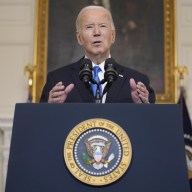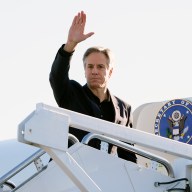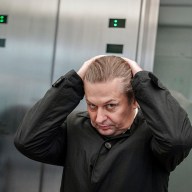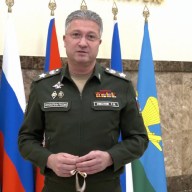By Tom Westbrook and Charlotte Greenfield
PORT MORESBY (Reuters) – The C in APEC stands for Cooperation. But when the two biggest members are fighting a trade war and using the forum to attack each other’s policies, it was always going to be hard work delivering on that.
The weekend’s Asia-Pacific Economic Cooperation summit in Port Moresby was one of open disagreement, led by disputes between the United States and China over trade, security and which would be the better investment partner for the region.
As APEC approaches its 30th anniversary, the failure to agree on a communique for the first time calls into question its relevance in a crowded summit calendar and as the Trump administration makes clear its aversion to multilateralism.
“It does mark the death of APEC’s founding trade vision,” Euan Graham, executive director of La Trobe Asia at Australia’s La Trobe University, said on Twitter, adding APEC was the “most disposable of the regional summits”.
Rather than cooperation, the theme seemed to be conflict and containment as Beijing and Washington directly criticized each other’s policies and staked their claims as to why they were the security and investment partner the Pacific should choose.
“It’s not even supposed to be binding, it’s APEC,” said one diplomat involved in negotiations for the communique, surprised that the members could not agree on what is usually a humdrum summary of issues discussed.
“China and the U.S. hijacked the APEC spirit, I suppose.”
The United States even preferred its own terminology of Indo-Pacific, which it defines as running from “the western shores of Latin America to the furthest reaches of the Indian Ocean”, with U.S. Vice President Mike Pence mentioning APEC five times and Indo-Pacific 41 times in his APEC speech on Saturday.
Without mentioning China by name, the U.S. State Department sought to cast the blame for the lack of a communique elsewhere, lamenting what it characterized as the unwillingness of some to sign on to a statement agreeing to promote free and fair trade.
“It is unfortunate that not all economies – despite their rhetoric – could support these positions,” it said in a statement.
Speaking in Beijing on Monday, Chinese Foreign Ministry spokesman Geng Shuang said the United States attended APEC in a “blaze of anger”, causing disputes and disagreements and damaging the “harmonious atmosphere” of the meeting.
“APEC is a platform to deepen cooperation, not a place to criticize each other. China attended to promote cooperation and seek consensus, not to get into a boxing ring,” Geng told reporters.
‘NOT A BIG DEAL’
Founded in 1989 with a view to fostering trade and economic ties around the Pacific Ocean, it operated at a ministerial level until 1993 when U.S. President Bill Clinton established the annual leaders meeting. Each meeting had produced a joint statement at its conclusion, until Sunday.
“This is very concerning from a systemic perspective. The WTO faces similar challenges,” said Charles Finny, a Wellington-based trade consultant and a former New Zealand government trade negotiator.
In an editorial, Chinese state-run tabloid the Global Times said the absence of a communique was “not a big deal”, and placed more significance on an upcoming meeting between U.S. President Donald Trump and Chinese President Xi Jinping.
The two leaders are expected to meet at the G20 summit, which starts in Argentina next week.
“It is hoped Washington makes serious preparations for the summit and not pin its hopes on exerting pressure,” said the tabloid, which is known for its nationalistic stance.
Still, there did seem to be some Chinese concern over the communique, with officials rebuffed on Saturday when they tried to meet Papua New Guinea (PNG) Foreign Minister Rimbink Pato on the issue.
Pato confirmed to Reuters that Chinese officials had wanted to see him, but said they had not made “necessary arrangements”.
As the APEC host, it was Papua New Guinea’s role to produce a communique. But the hostility and conflicting visions on display meant few blamed the group’s poorest country for being caught between two feuding superpowers.
“In these times, chairing a gathering such as the leaders that we had over the last few days is no easy task,” Australian Prime Minister Scott Morrison said, adding PNG Prime Minister Peter O’Neill had shown great integrity and leadership.
BACK ON THE MAP
Indeed, one big change was that long-forgotten Pacific nations found themselves aggressively courted by the two big-spending superpowers competing for influence in the strategically important ocean.
Pence said the United States would join Australia to help PNG build a navy base on its Manus Island, which was a U.S. base in World War Two, after China had emerged as a possible developer of the deepwater port.
Analysts had said a Chinese presence on Manus could have affected the West’s ability to navigate in the Pacific while offering China a site close to U.S. bases in Guam.
The United States, Japan, Australia and New Zealand also unveiled a $1.7 billion plan to bring electricity and the internet to much of PNG, a collective counter-attack to the lure of Beijing’s flagship Belt and Road program.
“Whatever concepts have been raised by the United States or China or Australia doesn’t necessarily mean that these are the same concepts for Papua New Guinea,” Wera Mori, PNG Commerce and Industry Minister, told Reuters by phone.
“We have our own situations and our own priorities to focus on.”
(Reporting by Tom Westbrook and Charlotte Greenfield; Additional reporting by Philip Wen and Jonathan Barrett, and Ben Blanchard in Beijing and Tim Ahmann in Washington; Writing by John Mair; Editing by Shri Navaratnam and Peter Cooney)


















